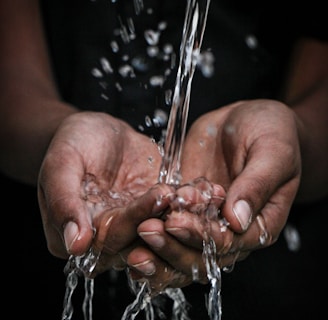Click the Donate Button and support CUSP’s work. Donations accepted via bank transfer.
Water Justice: Rethinking Rights, Access, and Equity in Pakistan
5/16/20257 min read


A Tale of Thirst: The Lives Weaving through Water Inequity
In the heart of rural Pakistan, the sun glares mercilessly upon a small village named Jumo Jatoi. Here, families rise with the dawn, driven by an urgent need to secure the most vital resource: water. As the day unfolds, the stark reality of water inequity becomes disappointmentingly evident. Ahmed, a father of four, sets out each morning with worn-out barrels, hoping to fulfill his family's daily water needs, often leading a procession of neighbors, each carrying their own empty containers, united by a singular goal yet divided by their circumstances.
The community faces significant challenges; several households lack access to clean drinking water, a basic human right. Residents rely on a murky pond at the village's edge, a once-reliable source now tainted by pollution and neglect. The emotional toll is palpable. Mothers worry, their thoughts clouded with dread over their children's health as they drink water that may cause illness. Each day is a struggle, a battle against both the elements and an unjust system that overlooks their plight.
Ahmed recalls a time when the village reservoir was filled to the brim, a moment that stands in stark contrast to the harsh present. Yet, amidst the adversity, stories of resilience emerge. The community organizes to safeguard their water rights, meeting regularly to discuss strategies for advocating to local authorities for improved access. Their collective strength reflects a growing awareness of the fundamental right to clean water, a right that is often taken for granted. Each voice contributes to a greater chorus calling for water justice, a critical agenda that resonates far beyond Jumo Jatoi, reverberating throughout Pakistan.
Understanding Water Rights: A Pillar of Sustainable Development
Water rights are an essential component of sustainable development, particularly in regions where water scarcity poses a significant challenge to communities. The fundamental concept of water rights encompasses the legal and social entitlements of individuals and communities to access freshwater resources. Secure and equitable access to water not only ensures the basic needs of survival but also fosters social justice, health, and economic stability. In Pakistan, where water scarcity is a pressing concern, rethinking and reinforcing water rights can lead to enhanced resilience and prosperity.
Equitable access to water is intrinsically linked to social justice. Marginalized groups often face discriminatory practices that hinder their ability to access water resources. By affirming water rights, we can empower these communities, enabling them to secure their livelihoods and improve their overall quality of life. Moreover, the health implications of inadequate water access are profound. Waterborne diseases pose significant threats, particularly in underprivileged areas, thus highlighting the necessity for sustainable water rights that ensure safe drinking water and sanitation.
Economic stability is another vital aspect influenced by water rights. Secure access to water for agricultural purposes can enhance food security, create jobs, and stimulate local economies. Furthermore, educational initiatives focusing on water management can empower youth and women, integrating them into the decision-making processes that shape their communities. Successful examples of water rights initiatives, such as community-managed water projects in rural areas of Pakistan, demonstrate the transformative impact these rights can have. Such initiatives not only promote sustainable water use but also pave the way for greater participation and equity in water governance.
In essence, redefining and promoting water rights is paramount for enabling sustainable development. It is crucial for fostering social equity, improving public health, and enhancing economic opportunities across communities in Pakistan.
Cultural Perspectives on Water and Community Practices
Water in Pakistan holds significant cultural and spiritual value that transcends its basic necessity for sustenance. Various communities regard water not just as a resource but as an integral part of their identity and heritage. Traditional practices surrounding water use are deeply embedded in the cultural fabric of society, influencing communal relationships and social structures. For instance, in rural areas, access to water resources is often associated with rituals and communal gatherings that reaffirm social ties. These practices exemplify how water is interwoven with agricultural cycles, religious observances, and seasonal festivities.
Historical contexts play a crucial role in shaping contemporary water management practices in Pakistan. The Indus River, one of the longest in the country, has been central to agricultural development and community survival. Over centuries, various local communities developed intricate systems for managing water distribution, often governed by unwritten rules and mutual agreements that reflect the values of trust and cooperation. Such historical narratives highlight the importance of integrating these local customs and indigenous knowledge into modern policy-making processes. Policymakers can learn from traditional water-sharing techniques and community governance models that have sustained populations for generations.
As Pakistan grapples with increasing water scarcity and environmental changes, it becomes essential to acknowledge and respect these cultural perspectives on water. The interplay between tradition and modernity must be recognized in strategies aimed at equitable water distribution and management. By fostering an inclusive dialogue that incorporates the wisdom of local communities, new policies can emerge that not only address immediate water needs but also celebrate and sustain cultural practices surrounding water. This holistic approach underscores the need for a water justice framework that resonates with the diverse voices of the nation.
Environmental Dimensions of Water Scarcity: The Climate Crisis
Pakistan is currently facing an escalating water crisis which is significantly influenced by the ongoing climate crisis. The interaction between climate change and water scarcity in the region poses severe implications not only for environmental sustainability but also for social equity and justice. As global temperatures rise, changing weather patterns are directly affecting the availability and distribution of water resources, making the situation particularly dire for vulnerable populations. According to recent studies, alterations in seasonal rainfall and increasingly frequent droughts are leading to reduced river flows and diminished groundwater levels, thereby exacerbating water scarcity throughout the country.
The implications of these climatic changes are felt most profoundly by marginalized communities, who often lack the necessary resources to adapt to these environmental challenges. These populations are reliant on agriculture and natural water sources for their livelihood, and climate-induced disruptions can lead to devastating economic consequences. Moreover, competition for dwindling water resources can result in social tensions and conflicts, illustrating how environmental issues intertwine with social justice.
It is critical to recognize that the impacts of climate change do not affect all communities equally. Generally, those who are already experiencing socioeconomic vulnerabilities are the hardest hit. Therefore, efforts to address water scarcity must include the voices and needs of these affected populations. Adapting water management strategies to mitigate the consequences of climate change is urgently required to ensure not only the availability of water resources but also the equitable distribution among all communities. Effective policies must consider integrated approaches that involve conservation techniques, rainwater harvesting, and the development of resilient infrastructure to enhance water security in an increasingly unpredictable climate.
Voices from the Margins: Stories of Resilience and Advocacy
In Pakistan, the struggle for water justice is not only about access to clean water but also about the right to dignity and survival. Marginalized populations, particularly women, ethnic minorities, and rural communities, often bear the brunt of water insecurity. These groups have faced systemic neglect and discrimination, which exacerbate the challenges they encounter in obtaining this essential resource. Their stories reveal a profound resilience, demonstrating not only their struggles but also their capacity for advocacy and change.
Women, in particular, are at the forefront of the fight for water rights. In households where water scarcity is a daily reality, women often travel long distances to fetch water for their families. This labor is unrecognized and undervalued, yet it is crucial for the survival of communities. Many women have organized themselves into collectives, raising awareness about water justice and advocating for policy changes. They participate in dialogue with local authorities, highlighting the need for equitable distribution of water resources, especially in marginalized regions. Their voices have become vital in reshaping narratives around water rights.
Ethnic minorities and rural communities face unique challenges in their quest for water equity. Discrimination and neglect from policymakers have led to unequal access, perpetuating a cycle of poverty and disenfranchisement. However, grassroots movements are emerging across the country, driven by these communities. They are documenting their experiences, leading campaigns, and engaging in direct action to demand their rightful access to water. Through these efforts, they are not only calling for immediate solutions but also striving for systemic transformation in water management policies.
The narratives from these marginalized groups underscore the importance of amplifying underrepresented voices in the water rights discourse. Each story of resilience and advocacy contributes to a broader understanding of water justice in Pakistan, urging society to recognize and rectify the injustices faced by vulnerable populations. By prioritizing their experiences and insights, a more equitable framework for water rights can be envisioned, ultimately benefiting all citizens.
Towards a Just Future: Innovations and Strategic Solutions
Achieving water justice in Pakistan necessitates innovative practices and strategic solutions that address disparities in access, distribution, and management of water resources. One promising approach involves leveraging technology to monitor water usage and availability. Smart water management systems can provide real-time data, enabling stakeholders to make informed decisions regarding allocation, conservation, and infrastructure development. These systems can help track water quality and ensure that communities receive safe drinking water, while also optimizing usage in agriculture, which is crucial given the country's reliance on this sector.
Community-led initiatives play a pivotal role in advancing water equity. Grassroots movements that empower local populations to participate in decision-making processes can significantly reshape water governance. Organizations can foster collaborations between communities and governmental bodies to develop self-management frameworks for local water resources. By engaging community members, these initiatives deepen the understanding of local needs and promote sustainable practices, enhancing ownership and accountability among users.
Policy reform is another critical component in fostering water justice. Government agencies must re-evaluate existing laws and policies governing water distribution to address inequities and ensure fair access for marginalized communities. This might include the implementation of tiered pricing structures based on usage to discourage waste and promote conservation. Policymakers should also incentivize investments in water infrastructure, particularly in underdeveloped regions, prioritizing areas with the greatest need. Facilitating partnerships between NGOs, governmental authorities, and community organizations can drive holistic approaches to water management, ensuring that solutions are culturally relevant and politically viable.
Collaborative efforts among these diverse stakeholders are essential. By aligning goals and resources, it is possible to form a cohesive strategy that not only addresses immediate needs but also establishes lasting frameworks for equitable water access. This collective ambition can propel Pakistan toward a future where water justice is a fundamental right, fostering resilience and prosperity for all its citizens.
